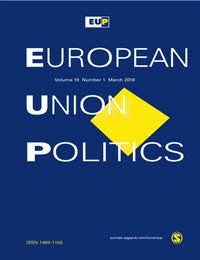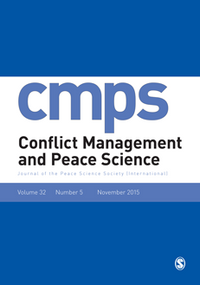Democracy Promotion in EU Enlargement Negotiations An Original Contribution to Democratization
Grimm, Sonja (2019): Democracy Promotion in EU Enlargement Negotiations: More Interaction, less Hierarchy. In: Democratization, Vol. 26, No. 5: 851-868.
In the integration literature, the relationship of the European Union (EU) as a donor and the (potential) candidates for EU membership as recipients of democracy promotion is described as asymmetrical. The donor is portrayed to have full whereas recipients have moderate or even no leverage over democratic reform what brings a hierarchical notion of active donors versus passive recipients into the analysis. Taking the local turn into consideration, however, this contribution argues that democracy promotion, is better conceptualized as a dynamic interplay between external and domestic actors. It reveals the toolbox of instruments that both sides dispose of, traces the dynamic use of these instruments, and systematizes the structural and behavioural factors that constrain the negotiation interplay. A case study of negotiations over public administration reform in Croatia in the context of EU enlargement shows that domestic actors dispose of leverage that counterweights external leverage and mitigates the implied hierarchy.
Democratization via Aid?
An Original Contribution to European Union Politics
Sonja Grimm/Okka Lou Mathis (2018): Democratization via Aid? The European Union’s Democracy Promotion in the Western Balkans 1994-2010. In: European Union Politics, Vol. 19, No.1, pp. 163-184.
In this article, we investigate the effect of European Commission democracy assistance on democratization in the countries of the Western Balkans. The analysis is based on a comprehensive dataset of the financial assistance given by the European Commission to the region from 1994 to 2010. Since this dataset is disaggregated into different sectors, it allows for the distinction between direct and indirect approaches to democracy promotion. The regression results do not confirm the expected positive association between direct democracy promotion and democratization in the Western Balkans. We contextualize our findings by considering the specific post-conflict context in the region and the European Commission’s conflicting policy objectives in play.
Dataset, Online-Appendix, do- and log-files availabe on the EUP website and upon request from the authors.
Studies of International Democracy Promotion in Post-conflict Societies and Fragile States (2010-2018)
In my cumulative habilitation project I investigate the instruments and strategies of international democracy promotion in post-conflict societies and fragile states, the effects of such external support and the reasons for the (mostly limited) effectiveness of international democracy promotion. Three research questions are investigated: How do external actors promote democracy in post-conflict societies and fragile states? How effective is international democracy promotion in post-conflict societies and fragile states? What does influence the effectiveness of international democracy promotion in post-conflict societies and fragile states? To understand successes and failures in post-conflict democratization, the standard literature is right to argue that both external and domestic structures and actors need to be taken into account. However, this is not sufficient to explain the limited effectiveness of international democracy promotion in post-conflict democratization. In my view, the interplay of external and domestic actors in political power struggles during regime transition corresponding to international democracy promotion and post-conflict democratization also needs to be taken into account. Why domestic actors adapt or not towards democratic rules and norms can be explained through the dynamics of the external-domestic interplay, conflicts of preferences between and among external and domestic actors and domestic constraints such as the existence of domestic third parties that limit the room to manoeuvre of relevant domestic political actors.
Funded by the University of Konstanz and the Institute for Advanced Study, Center of Excellence, University of Konstanz.
United Nations Peacebuilding and the Democratization of War-torn States
An Original Contribution to Conflict Management and Peace Science
Steinert, Janina/Grimm, Sonja (2015): Too good to be true? United Nations Peacebuilding and the Democratization of War-torn States. In: Conflict Management and Peace Science, Vol 32, No. 5: 513-535.
This article examines the effectiveness of UN peacebuilding missions in democratizing war-torn states, emphasizing those missions that include democracy promotion components in their mandates. Based on a multinominal logistic regression, we reveal that democratization is significantly more likely if a UN peacebuilding mission is deployed. Furthermore, regimes categorized as more liberal at the outset have an increased risk of revealing antidemocratization trends over the postwar period. Oil wealth impedes democratization and clear victory of one conflict party makes regime transitions more likely, yet in both directions. Descriptive statistics suggest that an increase in the mission’s capacities may be conducive to democratization.
Dataset, Online-Appendix, do- and log-files availabe on the CMPS website and upon request from the authors.
The Notion of "Fragile States": Between Power and Knowledge (2011-2014)
Knowledge is power. Since Foucault and Bourdieu, social sciences enjoy epistemological and conceptual tools to dissect such an old saying. In international relations, the interrogations regarding the use of knowledge have been specifically explored through constructivism as well as critical studies. The capacity to shape the representations of the reality is an attribute of power on the same account as raw military capacities. The notion of failed states appears as one of these attempts made by powerful actors to describe the reality according to their priorities. This project aims to bring together professionals and academics from various fields of expertise (development, state- and peace-building, democratization and asymmetrical violence). The purpose is to reflect upon the use of the notion of "fragile state" in order to discover patterns of legitimation of intervention strategies and tools to overcome "state fragility" whereby external actors heavily influence domestic politics from the outside. In order to uncover the politicized uses of state "fragility," participants of the panels will tackle: Who uses the "fragile states" notion and for what purpose? How and in which condition this framework has been elaborated?
This is a joint project by Dr. Sonja Grimm, Dr. Nicolas Lemay-Hébert, University of Birmingham, and Prof. Olivier Nay, Université de Sorbonne, Paris I. A special issue titled "Fragile States: A Political Concept" presenting the findings of the project has been published in Third World Quarterly, Vol. 35, No. 3 (2014).
EU Democracy Promotion in the Western Balkans (2011-2014)
The purpose of this project is to investigate and explain how the mode of interaction of the European Union (EU) and the national governments in (potential) candidate countries of the Western Balkans influences the adaptation of the democratic behaviour of relevant domestic actors. In studying the effects of the external-domestic interplay, the project brings domestic actors back into democracy promotion research; it goes beyond studying compliance of rule adoption, but focuses on rule application and behavioural changes of relevant political actors; and it systematically takes post-conflict contexts into account. Democracy promotion takes place in the framework of a two-level game. The project puts special emphasis on the first level, namely on the interaction between the EU as the external democracy promotion actor with the national governments and their administrations as the relevant domestic actors. Considering the effects of the second level on domestic policy-making, the team members will consider to which extent domestic veto players and national constituencies constraint the behaviour of national governments. The research design is based on qualitative methods of empirical enquiry such as semi-structured interviews, media and document analysis, combining a case study approach with cross-country and cross-reform-issue comparative analysis. It uses the interference logics of process tracing and structured, focused comparisons. The project seeks to develop a theory about the influence of the internal-external interplay on the adaptation of democratic behaviour and gives recommendations for more effective post-conflict recovery.
The results have been published...
- Grimm, Sonja/Groß, Lisa (2016): Conflicts of Preferences and Domestic Constraints: Understanding Reform Failure in Liberal Statebuilding and Democracy Promotion. In: Contemporary Politics, Vol. 22, No. 2: 123-145
- Pawelec, Maria/Grimm, Sonja (2014): Does National Identity Matter? EU Political Conditionality and Serbia’s Cooperation with the ICTY. In: Journal of Common Market Studies, Vol. 52, No. 6: 1290-1306.
- Grimm, Sonja/Gross, Lisa (2014): Building an EU Member State through Democracy Promotion: The Case of Croatia’s Public Administration Reform. In: Annals of the Croatian Political Science Association, Vol. 10, No. 1: 93-109.
- Gross, Lisa/Grimm, Sonja (2014): The External-domestic Interplay in Democracy Promotion: A Case Study on Public Administration Reform in Croatia. In: Democratization Vol. 21, 2014 - Issue 5 .
- Grimm, Sonja (2014). The European Union’s Ambiguous Concept of ‘State Fragility’. In: Vol. 35, No. 2, special Issue: fragile States: A political Concept (2014) pp. 252-267
The project has been funded by the Young Scholar Fund of the University of Konstanz.
Can Democracy be Imposed? External Democracy Promotion after Military Intervention 1945-2010 (PhD research project 2005-2010)
The purpose of this project is to investigate the influence of external actors on transition and regime change through and after military intervention. External actors increasingly seek to induce democratic regime change in conflict torn societies to secure peace and stability. However, the legality, legitimacy and effectiveness of changing a political system in a sovereign country through large scale external intrusion in domestic state affairs have to be questioned. Cases of external democratization between 1945 and 2010 are investigated and the dilemmas of external democratization after military intervention are discussed. The project takes a special glance on the external supervision in Bosnia and Herzegovina, the international trusteeship administration in Kosovo, the multilateral monitoring mission in Afghanistan and the US occupation of Iraq. A critical comparison with West Germany’s way to democracy under Allied oversight 1945 till 1949 rounds up the analysis. It becomes apparent that the dilemmas of external democratization can hardly be solved and democratization success by externally induced regime change is limited.
The results of this project have been published as "Erzwungene Demokratie: Politische Neurodnung unter externer Aufsicht nach militärischer Intervention" (in German) in 2010, supported by a publication grant of the Social Science Research Center Berlin [WZB] and the Peace Research Institute Frankfurt [PRIF/HSFK].


